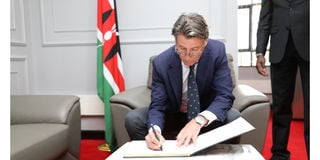Athletes a national treasure, and they must be protected

World Athletics President Sebastian Coe signs the visitors book on January 4, 2023 at Maktaba Kuu in Nairobi where he held a meeting with Sports CS Ababu Namwamba.
The 2011 IAAF World Championships (now World Athletics) Semi-Final Heat One must be etched on Ugandan athlete Annet Negesa’s memory.
On Lane 1 in the now-familiar yellow vest that has come to represent Uganda in the faces of Halimah Nakaayi, Jacob Kiplimo and Joshua Cheptegei, she ran the first 400 metres beautifully.
But Negesa did not progress to the final of what became one of her last major elite competitions.
Then weeks to the 2012 London Olympics, Negesa was informed that she would not participate in the world’s most prominent competition. No, she had engaged in doping; her naturally occurring testosterone levels were high.
To return to elite athletics, the IAAF demanded that she either take medication or undergo surgery. The doctor told her he would only perform a minor surgery. But she would wake up at the Women’s Hospital International & Fertility Centre, Kampala, with her body cut open, mutilated. She never recovered her athletics prowess. Years later, she was forced into exile.
Negesa is just one of the athletes the World Athletics considers to have a Differences in Sex Development (DSD) . Others include Caster Semenya (south Africa), Margaret Wambui (Kenya), Francine Niyonsaba (Burundi) and the Namibian duo of Beatrice Masilingi and Christine Mboma.
These women have competed at the highest levels and have stories to tell but Negesa’s is the most told because it is the most violent and the only one to have come out.
Obtaining blood samples
On March 26, Samuel David Basile, a Swiss, and his Kenyan accomplice, Geoffrey Kibet Bwambok, were arraigned in court over illegal athlete testing.
They were charged that, between March 3 and 7, they and others at Iten, Keiyo North Sub-County, Elgeyo Marakwet County, were found conducting research by obtaining blood samples from people without a licence from National Commission for Science, Technology and Innovation (Nacosti).
The suspects had drawn blood from athletes and their relatives without permission and contrary to the law. Basile pleaded guilty but Bwambok’s case is ongoing.
However, World Athletics has reportedly used similar tactics. Negesa claimed that there was no paperwork in her dealings with World Athletics, even though at a hospital in Nice, France,a physical exam, ultrasound, blood test and MRI were performed on her.
In her book The Race to be Myself, Semenya alleges that she was not informed on whether a gender test was to be conducted on her until 2009, when, in a Pretoria hospital, a doctor had to look at her naked body and perform tests on her to ascertain her sex.
World Athletics is said to treat athletes with DSD in a brutal, gruesome and discriminatory manner, eliciting human rights concerns. For instance, the World Medical Association has condemned the tests and called for an end to the practice.
Unfortunately, even with Wambui, the 2016 Olympic bronze medallist, Maximilla Imali and Evangeline Makena sidelined due to the World Athletics regulations on athletes with DSD, the silence within the government and athletics organisations, including the federation AK, has been deafening.
Kenya has produced world-renowned athletes and become a global phenomenon in the sport. Records by Faith Kipyegon, David Rudisha and the late Kelvin Kiptum, for instance, have over the past decade put the country on the global map. The ruling on illegal testing has set a valuable precedent on protection of athletes. Conducting gender tests on athletes without their prior knowledge and consent must be condemned in the strongest terms possible.
Negesa’s story should never be repeated.
- Mr Kariuki is a writer, sexual and reproductive health and rights (SRHR) advocate and athletics enthusiast. [email protected]. @murekareu





